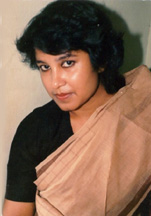Taslima Nasreen: Difference between revisions
RachelShuman (talk | contribs) No edit summary |
No edit summary |
||
| (4 intermediate revisions by 2 users not shown) | |||
| Line 1: | Line 1: | ||
====Date: [[:Category:1962|1962]]- ==== | ====Date: [[:Category:1962|1962]] - Present ==== | ||
| Line 6: | Line 6: | ||
====Subject: [[:Category:Political/Economic/Social Opinion|Political/Economic/Social Opinion]] ,[[:Category:Religion|Religion]]==== | ====Subject: [[:Category:Political/Economic/Social Opinion|Political/Economic/Social Opinion]] , [[:Category:Religion|Religion]]==== | ||
====Medium: [[:Category:Print Journalism|Print Journalism]] [[:Category:Literature|Literature | ====Medium: [[:Category:Print Journalism|Print Journalism]] , [[:Category:Literature|Literature]]==== | ||
---- | ---- | ||
[[File:t_nasreen.jpg|right|200px]] | |||
'''Artist:''' Taslima Nasreen, a Bangladeshi poet, writer, columnist and doctor | '''Artist:''' Taslima Nasreen, a Bangladeshi poet, writer, columnist and doctor | ||
| Line 19: | Line 21: | ||
'''Location:''' Bangladesh | '''Location:''' Bangladesh | ||
'''Description of Artwork:''' Bangladeshi poet, writer, columnist and doctor Taslima Nasreen took on writing about women's oppression. In her poetry and newspaper columns she criticizes religion, traditions, and the oppressive cultures and customs that discriminate against women. According to Taslima, the religious scriptures are out of time, out of place. Instead of religious laws, she maintains, what is needed is a uniform civil code that accords women equality and justice. <P> | '''Description of Artwork:''' Bangladeshi poet, writer, columnist and doctor Taslima Nasreen took on writing about women's oppression. In her poetry and newspaper columns she criticizes religion, traditions, and the oppressive cultures and customs that discriminate against women. According to Taslima, the religious scriptures are out of time, out of place. Instead of religious laws, she maintains, what is needed is a uniform civil code that accords women equality and justice. <P> | ||
| Line 32: | Line 33: | ||
'''Source:''' | '''Source:''' [http://taslimanasrin.com/index2.html Taslima Nasreen's official website] and [http://democracyfrontline.org/blog/?p=1597 Democracy Frontline blog] | ||
| Line 46: | Line 47: | ||
[[Category:Print Journalism]] | [[Category:Print Journalism]] | ||
[[Category:Literature]] | [[Category:Literature]] | ||
{{DEFAULTSORT:Nasreen,Taslima}} | |||
__NOTOC__ | __NOTOC__ | ||
Latest revision as of 19:38, 9 November 2016
Date: 1962 - Present
Region: Asia
Subject: Political/Economic/Social Opinion , Religion
Medium: Print Journalism , Literature
Artist: Taslima Nasreen, a Bangladeshi poet, writer, columnist and doctor
Confronting Bodies: Bangladeshi Islamic Fundamentalists
Dates of Action: 1990
Location: Bangladesh
Description of Artwork: Bangladeshi poet, writer, columnist and doctor Taslima Nasreen took on writing about women's oppression. In her poetry and newspaper columns she criticizes religion, traditions, and the oppressive cultures and customs that discriminate against women. According to Taslima, the religious scriptures are out of time, out of place. Instead of religious laws, she maintains, what is needed is a uniform civil code that accords women equality and justice.
The Incident: Taslima Nasreen’s strong language and uncompromising attitude against male domination stirred many people, eliciting both love and hatred from her readers. She is detested by Islamic fundamentalists who launched a campaign against her in 1990,staging street demonstrations and processions. They broke into newspaper offices that she used to regularly write from, sued her editors and publishers, and put her life in danger, a danger that only increased over time. She was publicly assaulted several times by fundamentalist mobs. No longer was she welcomed to any public places, not even to book fairs that she loved to visit. In 1993, a fundamentalist organization called Soldiers of Islam issued a fatwa against her, a price was set on her head because of her criticism of Islam, and she was confined to her house. The government confiscated her passport and asked her to quit writing if she hoped to keep her job as a medical doctor in Dhaka Medical College Hospital. She was thus forced to quit her job and go into hiding.
Results of Incident: Due to all the serious threats to her life, Taslima Nasreen was forced to go into hiding. But the international organization of writers, and many humanist organizations beyond the borders of Bangladesh, came to her support. News of her plight became known throughout the world. Some western democratic governments that endorse human rights and freedom of expression tried saving her life. After long miserable days in hiding, she was finally granted bail but was also forced to leave her country. Taslima has since been living in exile in Europe. She has written twenty eight books of poetry, essays, novels, and short stories in her native language of Bengali. Many have been translated into twenty different languages. Her applications to the Bangladesh government to be allowed to return have been denied repeatedly. One Bangladesh court sentenced her in absentia to a one-year prison term. The Bangladesh government has recently banned three other of her books, Amar Meyebela ( My girlhood), Utol Hawa (Wild wind) and Sei sob ondhokar (Those dark days).
Source: Taslima Nasreen's official website and Democracy Frontline blog
